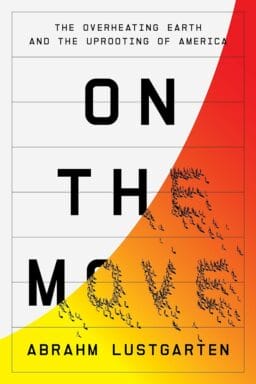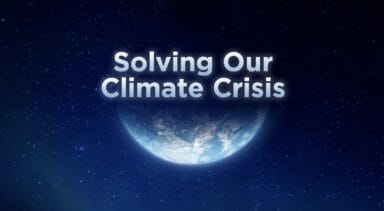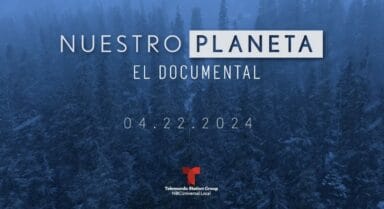
Climate’s Rising Significance Ahead of November Elections
Sign up for Climate on the Ballot, our weekly newsletter with ideas for reporting on climate and the 2024 elections.
This week, CBS News released new polling showing that climate change could be more important to voters in November’s US presidential election than many political pros have assumed.
We’ve known for a long time that Republicans are less interested in climate action than Democrats. The new CBS poll shows no surprises there: Liberals are more than twice as likely as conservatives to say that climate change needs to be addressed immediately. But the poll also illustrates a generational divide among conservative voters: Sixty-one percent of Republicans between the ages of 18 and 44 favor climate action, compared to 40% of conservative older than 45.
The CBS poll also finds that 58% of “moderate” voters think the US should encourage energy from more renewable sources like solar and wind, and the same percentage of moderates approve of the Biden administration’s spending on projects to reduce climate change.
These numbers suggest that climate could be a bigger factor than has been assumed in November’s elections.
So what do these groups want to know about the climate crisis? New research from the Yale Program on Climate Change Communication set out to answer this question by asking a variety of respondents what they’d most like to learn from a climate expert. Options included evidence of climate change, its causes, its impacts, and its solutions. The survey finds that a majority of both independents and Gen Z voters — 47% and 46%, respectively — want to know more about climate solutions.
This information is key for journalists looking to keep their audiences engaged and informed this election year. A growing number of people across the political spectrum understand that climate change demands urgent action and are communicating that concern in polling; meanwhile, audiences are increasingly sharing that they want more reporting on climate solutions. Let’s make sure we’re delivering.
From Us
Misinfo webinar recap. See key takeaways and reporting resources from our recent webinar on how to inoculate audiences against climate misinformation before they’re exposed. Take me there.
Noteworthy Stories
Pollution surge. US air pollution is getting worse due to climate change, according to a new report by the American Lung Association. Over 130 million Americans live in areas with poor air quality, with “high ozone days and spikes in particle pollution related to extreme heat, drought and wildfires,” contributing to the problem, according to the report. By Emily Mae Czachor at CBS News…
- See The American Lung Association’s report for air pollution grades in cities and counties across the US to localize the story.
Nature-based solutions. California has unveiled a plan that will transform more than half of the state’s 100 million acres into lands that can help fight climate change. The plan includes managing land to reduce wildfire risk, protecting biodiversity, and more with the goal of reaching carbon neutrality by 2045. By Hayley Smith at the Los Angeles Times…
Oil influence. Following a $25 million donation to Louisiana State University, Shell was able to influence research and coursework at the school, raising concerns about academic independence. The university also solicited money from other fossil fuel companies offering them the opportunity to review academic studies. By Sara Sneath at the Guardian…
Climate optimism. Though climate change is expected to get worse before it gets better, a lot of good work is being done to stop it, including the shift to clean energy. “We are on this cusp of a lot of really positive shifts happening … and those don’t get reported enough,” Elizabeth Weise, USA Today’s national climate correspondent, says on “The Excerpt” podcast…
Summer Olympics. The city of Paris hopes to host the first carbon neutral Olympics, an event that typically leads to major carbon emissions. Chase Cain, NBC national climate reporter, reports from Paris on how organizers plan to achieve this ambitious goal.
Book of the Week
Reading books can deepen your climate knowledge and identify book excerpts and authors to interview
 On The Move: The Overheating Earth and the Uprooting of America, by Abrahm Lustgarten
On The Move: The Overheating Earth and the Uprooting of America, by Abrahm Lustgarten
Published: March 26, 2024
Migration is increasingly shaping international politics and climate change will drive a surge of migration in the years ahead. Abrahm Lustgarten’s deeply reported book makes it clear there are big changes to come. As the climate crisis intensifies, two billion people will find themselves in places too hot or dry for humans to inhabit. Experts project this will happen by 2070, within the lifetimes of today’s children. Where will all these climate refugees go? Initially, to cities, almost none of which are prepared. “People are … going to move,” Lustgarten writes, “Moving, after all, is the ultimate form of climate adaptation.”
Resources
Want to publish more global work? The new UK-based environmental journalism website Dialogue Earth, previously the China Dialogue group of environmental websites, has country editors in Africa, Latin America, and South and Southeast Asia. Stories are published and translated into eight languages, available for republication under Creative Commons.
Power outages. Climate Central has released new information, data, and graphics on local weather-related power outages in the US.
Organic farming. The Association of Health Care Journalists has a new tip sheet on organic farming, including background information, contacts, and story ideas.
Climate claims. AFP’s 45-minute course on verifying climate claims in your reporting is available in English, French, Spanish, and Portuguese.
Conservation jargon. Revelator Editor John Platt shares conservation jargon that he says should “go extinct.” “Methane gas” should replace the misleading term “natural gas,” for example.
Fact attribution guide. Attributing facts in your stories is key to maintaining journalistic credibility. NPR’s guide looks at what content needs attribution and how to do it.
Journalism festival. The Reuters Institute has a roundup of key learnings from last week’s International Journalism Festival 2024 on topics including social media, news avoidance, AI, and the war in Gaza.
Events
Climate & AG. SciLine is holding a webinar, “Climate change and agriculture: pests, pathogens, and pollinators,” on April 29. RSVP.
Parched Panama. World Weather Attribution will hold a press briefing on a new study investigating the influence of climate change and El Niño on the low rainfall in Panama during 2023. April 30. RSVP.
Press Freedom. The theme of this year’s World Press Freedom Day (May 3) is “A Press for the Planet: Journalism in the face of the environmental crisis.”
- The Wilson Center’s Environmental Change & Security Program and The Society of Environmental Journalists are holding a webinar, “Environmental Journalists on the Frontlines of Democracy,” on May 1. RSVP.
- The Society of Environmental Journalists and Freedom of the Press Foundation are holding a webinar, “The Intersections of Press Freedom and the Environment,” on May 2. RSVP.
Crash course. SciLine is holding a course, “Science essentials for local reporters,” on May 6. RSVP.
AI & news. The World Association of News Publishers is holding its annual congress, “Shaping the Future of News Media in the AI Era,” from May 27-29 in Copenhagen. Learn more.
Kudos
Two standout reports this week effectively helped audiences grasp the scope of the climate crisis. The first, “Solving Our Climate Crisis,” by WKOW-TV, delves into how climate change is impacting Wisconsin, and how residents are adapting. The story helps audiences understand climate impacts, causes, and solutions, using scientific data, accessible language, and more.

The second, “Our Planet: Voices of Climate Change,” a documentary from Telemundo Orlando, highlights how climate is impacting Hispanic farm workers, rancheros, fishermen, and students from Alaska to Puerto Rico. It’s an example of how visually compelling the climate story can be.

Jobs. The Committee to Protect Journalists is hiring a development assistant. Dow Jones is looking for a reporter – voluntary carbon market (remote). The New York Times is recruiting a senior editor for its weather team. ProPublica is hiring a senior editor for its local reporting network (remote or in-person).
Climate policy pitches. Floodlight is looking for freelancers to report on the Inflation Reduction Act.
Local reporting fellows. ProPublica is looking for five newsrooms, in five different US states, to collaborate on an investigative project for one year. ProPublica will pay the annual salary for one full-time reporter in each newsroom. Apply by May 1.
OJA judges. The Online Journalism Association is accepting applications for volunteers to screen entries for their awards. Apply by May 9.
Climate disinfo fellowships. The Heinrich Böll Foundation, Washington, DC, is looking for US- or Canada-based journalists interested in reporting on climate disinformation case studies in North America. Apply by May 15.
Ocean reporting fellowships. The Pulitzer Center is accepting applications for its Ocean Reporting Network, to create a collaborative ecosystem of oceans-focused journalists around the world. Apply by May 26.
EIN Presswire does not exercise editorial control over third-party content provided, uploaded, published, or distributed by users of EIN Presswire. We are a distributor, not a publisher, of 3rd party content. Such content may contain the views, opinions, statements, offers, and other material of the respective users, suppliers, participants, or authors.

